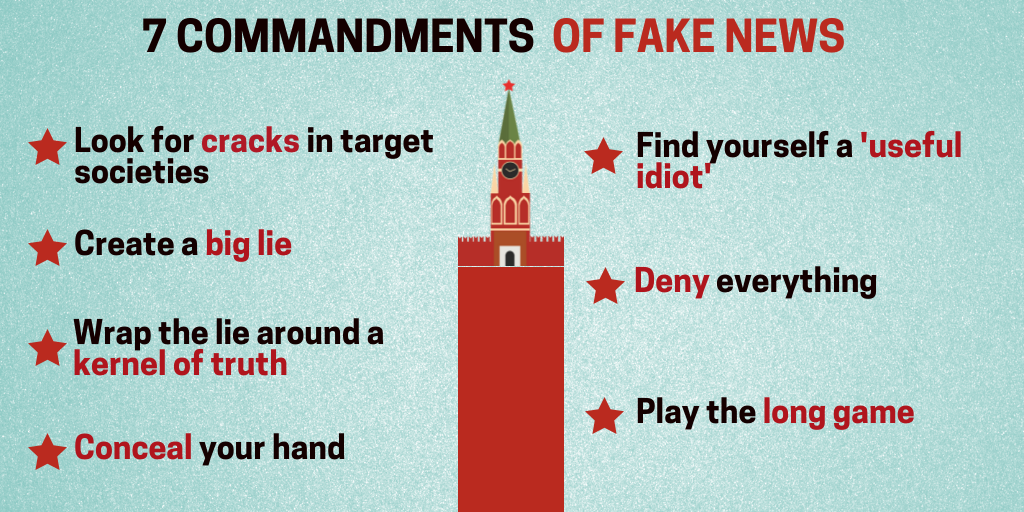Editor’s Note
Russia is the only suspect in the downing of Malaysia Airlines Flight MH17 over Eastern Ukraine. And since the crash Russia has been trying to be involved in the investigation despite the fact that no Russian nationals were among the victims, the crash didn’t occur over the Russian territory, Russia didn’t even design or manufacture or operate the Boeing 777. Finally, the aircraft wasn’t even registered in Russia.
The Russian approach to fake news is just the same. While Russian state generates and spreads tons of fake stories and misinformation, Russia wants to develop a system “under the auspices of the UN” to tackle fake news and, of course, the system should “meet the interests of all countries [read: of Russia – Ed.]”
A crucial part of Russian propaganda is also deception game about serious counter-disinformation activities and faking the concern about “fake news”.
“Thief cries, catch the thief!”
When pro-Kremlin commentators attempt to blur the facts about MH17, they insist that any investigation that does not include Russia among the investigators cannot be considered credible (despite the fact that Russia fabricated the only “evidence” it has presented).
This strategy, when an actor creates a problem and insists the problem cannot be solved without his permission and cooperation, can have multiple applications – and it can also be very effective in the communication domain.
Fakes about fakes
Thus, Russia – whose aggressive dissemination of fakes and disinformation have made it the only international actor to concern the 28 Heads of EU States enough for them to ask for a dedicated counter-disinformation unit by way of response – has publicly declared concern about “the spread of fake news,” as Vice News informed in May. A senior official from the Russian Foreign Ministry said that the problem should be dealt with at the level of United Nations.
“[Maxim] Buyakevich proposed that countries work together to develop a system under the auspices of the UN to tackle the proliferation of fake news, one that would meet the interests of all countries,” says the article.
It is hard to see how this initiative could ever have any meaningful result.
Accuse your enemy of what you are guilty of
It is not the first time that the Kremlin feigns an interest to enter the field of countering disinformation. One year ago, the Russian Ministry of Foreign Affairs announced a project that would track “fake news” about Russia in the Western press.
The Kremlin limited the fact-checking attempts to a huge red stamp saying FAKE. And the expert community soon ridiculed them. For comparison, please, see the disproof section for one of the cases reported in the last DisinfoReview.
Around the same period of time, also the Kremlin’s disinformation bulwark Russia Today announced its fact-checking service called “FakeCheck.” Also, in this case, real experts in this topic described the attempt to enter the field of countering disinformation as feeble. See another article by DFRLab: “The final four FakeCheck entries also recycle content, but they appear to have done so, not to expose disinformation, but to perpetuate it,” writes Ben Nimmo.
Apart from the above, there is one more benefit for Russia in launching initiatives like these. When you pretend that you are concerned about a problem, then it gives you the opportunity to present yourself as a victim of a problem, not as its instigator.
To put it in simpler words often used by our favorite satirical account: “Accuse your enemy of that which you are guilty”
Further reading:
- A Fake Fact Checker – Again
- A guide to Russian propaganda
- Propaganda – the opiate of the masses in Putin’s Russia
- Fake Western experts as a propaganda tool on Russian TV
- Corruption and disinformation: Backstage at Russian TV
- 15-point checklist of Putin regime’s propaganda techniques
- To the making of Russian fake news, there is no end
- Russia fakes MH17 crash site satellite images, says SBU
- Denmark and Sweden to cooperate on combating Russian fake news
- Concentration camps for gays? Fake news, claims Russian human rights official
- Study: A third of Moscow TV news is about Ukraine, and 90% of it is negative
- A year of Russian propaganda: 1310 cases of Russian fakes debunked by EU watchdog
- Russia’s TV news: threatening Ukraine with nukes, claiming USSR only real democracy
- ‘Kremlin’s G-20 photofake to make Putin look important’
- Russia in The Hague: the lies, the fakes, and the fairy tales
- Top 10 fakes of Russian propaganda about Ukraine in 2015
- A guide to Putin’s 2015 Q&A press conference newspeak








